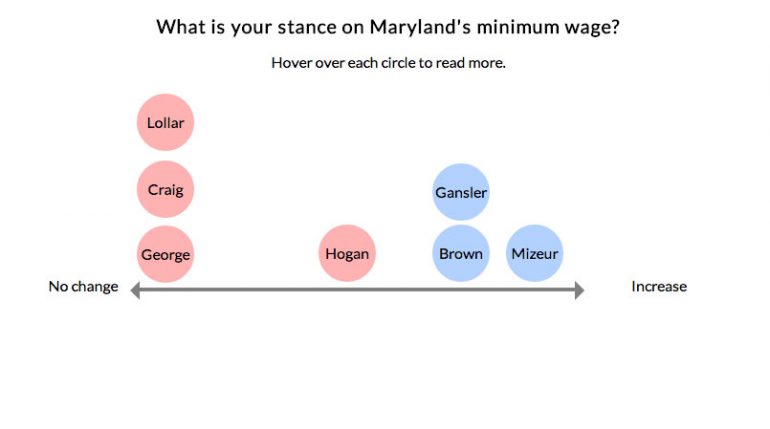ANNAPOLIS – When Gov. Martin O’Malley claimed a minimum wage increase as his top priority of the 2014 legislative session, his final as governor, he sparked a firestorm of debate between lawmakers in Annapolis and the handful of candidates fighting to succeed him.

O’Malley is now expected to sign into law a measure that would gradually raise the state’s minimum wage to $10.10 an hour by July 2018. The base rate of pay for most workers in Maryland currently stands at $7.25 an hour, on par with the federal rate.
The seven major gubernatorial hopefuls were split down party lines on the issue, according to their responses to a Capital News Service candidates’ questionnaire submitted while the session was underway.
The diversity of their answers reflected the nature of the battle fought this session by Maryland legislators and the debate still happening around the nation, including at the federal level. Earlier this year, President Obama called on Congress to raise the minimum wage for all workers to $10.10 an hour by 2015.

Lt. Gov. Anthony Brown, a Democrat and O’Malley’s pick for governor, had backed the administration’s original measure, which would have raised the Maryland minimum wage to $10.10 an hour two years sooner than the measure ultimately passed by the legislature, and increased the base rate of pay for tipped workers.
“I have worked with … O’Malley, non-profits, businesses, labor, and our partners in the General Assembly to raise the minimum wage for all Maryland workers,” Brown said in his response. “I stand behind our Administration’s proposal … which raises the statewide minimum
wage to $10.10 per hour and indexes future wages to the cost of inflation.”
The version that emerged from the General Assembly did away with provisions that would have pegged the minimum wage to inflation and raised pay for tipped workers. It also added in extra exemptions for certain businesses.
Attorney General Doug Gansler, another Democratic candidate for governor who has backed a minimum wage increase, said he also supported the indexing provision.
Lawmakers on the House Economic Matters Committee decided to ax the indexing measure in part to avoid tying the hands of legislators down the road.

But Gansler said that the current minimum wage is “so far behind inflation that it is difficult for families to make ends meet without public support for food, housing and medical care.”
“The real costs of low-wage work are high for taxpayers and employers,” he said. “No Marylander who works 40 hours a week should struggle to put food on the table or pay basic bills.”
Grassroots candidate Delegate Heather Mizeur, D-Montgomery, said that even before the changes made by the House, O’Malley’s proposal would not do enough to help low-wage workers.
She criticized the absence of an indexing measure and the “loopholes” that exist for seasonal workers.
“While I voted in favor of legislation this session to increase most minimum wage workers to $10.10 per hour, it will still leave far too many in poverty,” she said. “This is a step in the right direction but not the relief middle and low-income families deserve.”
Mizeur, who unsuccessfully fought to amend the bill on the floor of the House, is pushing a plan in her gubernatorial campaign that would raise the minimum wage for non-tipped workers to $16.70 by 2022. It would also boost wages for tipped employees and peg both rates to increase with inflation.

Republicans voiced loud opposition to a minimum wage hike, arguing that an increase would hurt small businesses and force business owners to layoff workers.
Charles County businessman and Republican gubernatorial candidate Charles Lollar said that “study after study” has shown a raise in the minimum wage would lead to job cuts.
In an underperforming job market, he said, he wants to make sure that those currently with work don’t lose their employment as a result of a hike that businesses can’t afford.
Lollar said he would instead work to eliminate the “74 new taxes and fees” that have reduced Maryland’s middle class while expanding its lower class.
“We want to make your dollar stronger rather than decrease its value,” he said.
Republican candidate Larry Hogan, an Anne Arundel County real estate broker and leader of the conservative advocacy group Change Maryland, said that the minimum wage debate in Annapolis is “a symptom of a much bigger problem in Maryland – a lack of economic growth” that has resulted in stagnant wages.
Hogan said that a minimum wage increase would force employers to layoff thousands of entry-level workers.

“The next governor will have to work very hard to attract new businesses to Maryland to make up for these job losses,” Hogan said.
GOP candidate and Anne Arundel County Delegate Ron George echoed the fear that a hike would translate to job cuts without having much of a positive impact.
He said the majority of minimum wage workers are people between the ages of 16 and 24 who have no dependents.
“[The minimum wage] is meant to provide young people work experience and allow for seasonal businesses to operate in Maryland making us a tourist destination with greater economic impacts felt across the state,” George said.
Republican candidate and Harford County Executive David Craig said he favors an elimination of the state income tax over an increase in the a minimum wage.
“By [letting Marylanders keep] more of their own well earned money instead of seeing the state spend it, a change in the minimum wage would be unnecessary,” Craig said.
With O’Malley set to sign the bill into law, Maryland is on track to join the more than 20 states with minimum wages above the federal level.
The gubernatorial primary election will be held June 24.





You must be logged in to post a comment.